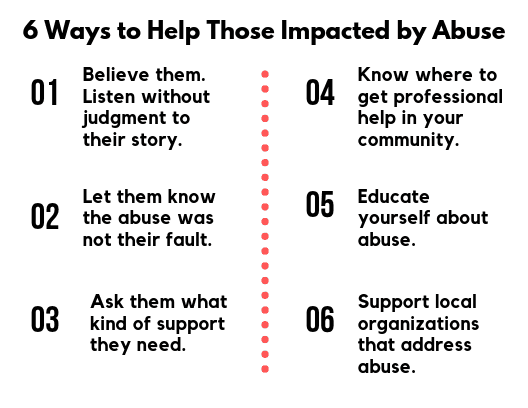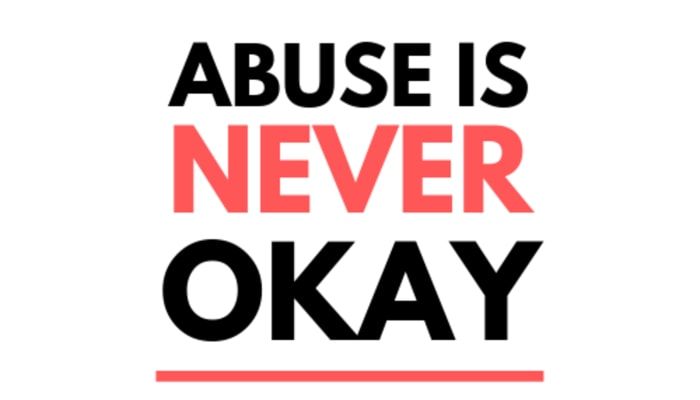By Christine Murray, Ph.D., LPC, LMFT, Director of the UNC Greensboro Center for Youth, Family, and Community Partnerships
October is Domestic Violence Awareness Month, and here in the Triad, we’re also launching the new Abuse Is Never Okay campaign in Guilford County. The Abuse Is Never Okay campaign is a partnership between the UNCG’s Healthy Relationships Initiative, the Guilford County Family Justice Center, and a network of other partners that include law enforcement agencies, local nonprofits, and other groups that work to prevent violence and help people who are affected.
Despite the common misconception that domestic violence is a private family matter, statistics tell us that abuse is very common and crosses all demographic and social categories. According to the CDC’s National Intimate Partner and Sexual Violence Survey, over 1/3 of all women in in the United States face sexual or physical violence or stalking perpetrated by an intimate partner at some point in their lives. Men also can become victims of domestic violence, and violence also can occur in same-sex relationships, just as it can in heterosexual relationships.
If you or someone you know is involved in an abusive relationship, or even if you are concerned that a relationship has become unsafe but aren’t sure if it would be considered abusive, it’s important to take steps to protect the safety of everyone involved.
First, seek help from trained professionals. It can be difficult to sort through the complex dynamics of an unhealthy or unsafe relationship on your own. The National Domestic Violence Hotline offers support at all times of day, and the hotline can be reached at 1-800-799-7233. There are several great local resources for help right here in the Triad as well:
- In Guilford County, the Guilford County Family Justice Center offers a “one-stop shop” of resources—including victim advocacy, legal services, law enforcement, and social services—at locations in Greensboro and High Point.
- Family Service of the Piedmont offers a range of victim services in Guilford County, including a local crisis hotline: 336-273-7273.
- In Forsyth County, Family Services is the main domestic violence victim service agency, and they also have a 24/7 hotline: 336-723-8125.
- Personal counseling also can be helpful, but it’s important to seek out a counselor who has adequate training and knows how to address the complex safety issues involved in domestic violence. In general, couples counseling is not recommended or considered safe for people who are involved in an abusive relationship.
Second, take time to learn about the patterns of power and control involved in abusive relationships. A relationship does not have to involve physical violence to be considered abusive, although certainly violence can become a dangerous aspect of abusive relationships. The defining feature of abusive relationships is that one person is using the abusive tactics as a means to control and have power over the other person. Some useful questions to help consider whether a relationship may be abusive include the following:
- Does your partner make you feel afraid?
- Is your freedom restricted by your partner?
- Does your partner isolate you or keep you away from your friends or family?
- Does your partner say or do things that make you feel “less than,” devalued, or worthless?
- Does your partner blame you for the hurtful things they do, or otherwise fail to take responsibility for their negative behaviors and actions?
Answering yes to any of the above questions may signal an abusive relationship and indicate that seeking professional help would be beneficial, as described above. One useful online resource for learning more about they dynamics of abusive relationships can be found at the web-site, www.domesticshelters.org.
Third, understand that an abusive person often doesn’t change on their own. It’s common for an abusive person to make a lot of promises that they will change or that they won’t use their harmful and abusive behaviors again. While it is certainly possible that some people can change on their own, in most cases, people who have perpetrated violence do not change without intensive intervention that they seek as they acknowledge and take responsibility for their role and their behaviors. Often, people who are abusive don’t seek an intervention treatment on their own unless they face some external costs, such as legal or career consequences. In fact, minimizing the harmful impact of their behaviors is a common part of the patterns of abusive relationships. Again, professional help can be valuable for determining the best way to respond to a specific person who is acting in abusive ways.
Fourth, take steps to protect any children who are involved. Abusive relationships—even if they don’t involve physical abuse—can have negative impacts on children. Even very young children can exhibit signs of trauma if they witness abuse or grow up in a home that is characterized by the chaos and tension that often accompanies abuse. In one research study that my colleagues and I did, we found that one of the major reasons that people eventually do leave abusive relationships is because they realize the impact of the violence on their children. Custody issues can be very complex in families that have experienced domestic violence, so it is important to seek legal counsel and professional support if you or someone you care about is considering a separation from an abusive partner if children are involved.
Overall, domestic violence remains a common, and always tragic, experience for many families in our community. Help is available, and there are many people working in our community every day to educate our community about abuse, as well as to support people who are affected. To learn more, please visit the Abuse Is Never Okay campaign at www.neverokayguilford.org, and connect with the campaign on Facebook and Instagram at @NeverOkayGuilford.

Want to see more blogs like this and get notifications on local events and happenings? Subscribe to our free weekly newsletters here.
















